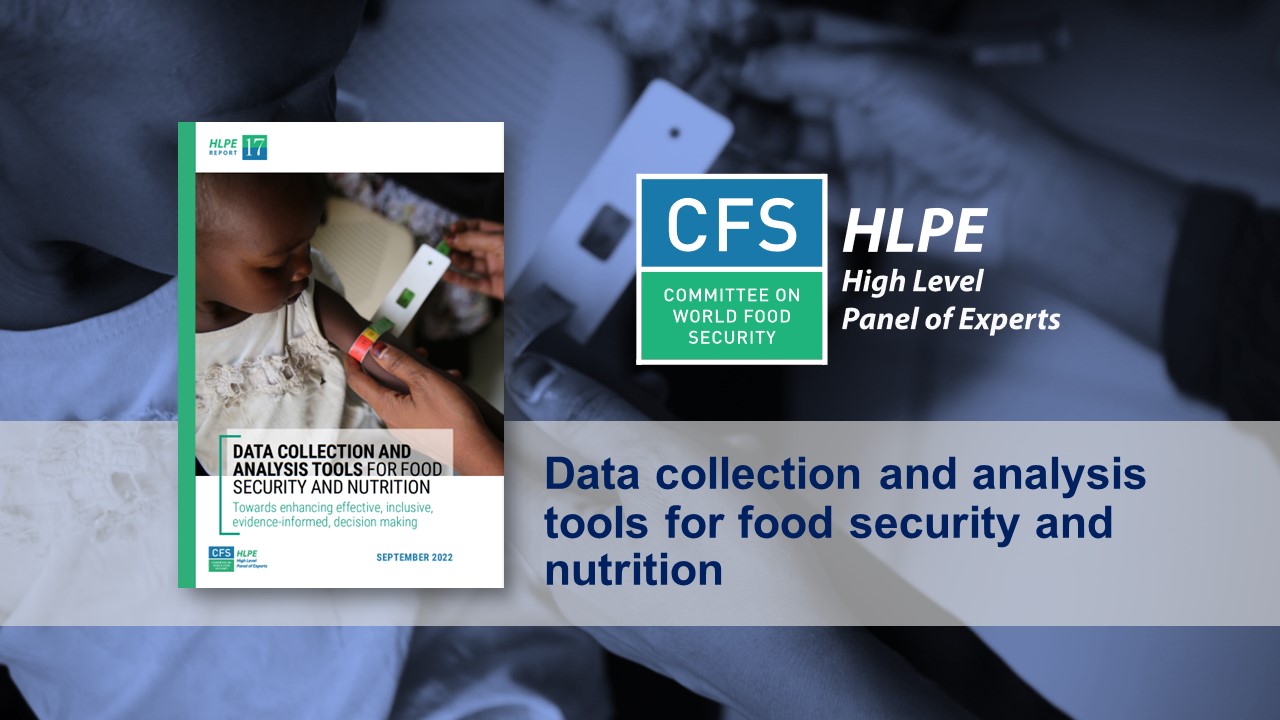
The report calls for rethinking the way data is used for food security and nutrition. Recognizing the data revolution and all its implications is necessary to effectively use data to transform food systems and achieve the Sustainable Development Goals.
📗 Read the executive summary in Arabic, Chinese, English, French, Russian and Spanish
📘 Read the report in Arabic, Chinese, English, French, Russian and Spanish
🖥️ Read the presentation delivered by Carlo Cafiero during the launch of the report
📺 View the live event recording of the launch of the report
👥 Follow the conversation: #data4FSN
The High Level Panel of Experts on Food Security and Nutrition (HLPE-FSN) of the Committee on World Food Security (CFS) launched its flagship report on “Data collection and analysis tools for food security and nutrition: towards enhancing effective, inclusive, evidence-informed, decision making”.
The report analyses the challenges and opportunities that exist in taking full advantage of the data revolution and outlines recommendations for policy- and decision-makers. The hybrid event that brought to centre stage the need for global coordination to improve FSN data governance, defined as a globally relevant set of principles, strategies, policies, regulations and standards developed by institutions to collect, manage, share and use data.
Speaking at the launch the report, Bernard Lehmann, HLPE-FSN Chairperson said there is an urgent need to agree on the nature of data and information related to food security and nutrition as a public good. “High-quality data and its accurate and timely analysis are essential for decision-making on food security and nutrition. While an abundance of data on food can provide great opportunities for transforming food systems, they can also create new risks and deepen inequalities”, Lehmann stated.
The report shows the necessity to establish a global legal framework that allows for the circulation of relevant information, while preserving the rights of the people to whom the data ultimately belongs.
"One key suggestion in this report is that, from a moral standpoint, personal data, like blood, is something that individuals may choose to give when that is necessary to obtain a personal service (for example, when blood is given for medical testing), but that people should also be encouraged to donate, when there is a clear indication that its use may contribute to a greater good (such as saving someone’s life). What should be crystal clear is that any resale of such data should be deemed immoral and even prosecuted as illegal", Carlo Cafiero, CFS HLPE-FSN drafting team leader explained during the launch of the report, at FAO haedquarters, in Rome.
Welcoming the report, FAO Director-General QU Dongyu said that the recommendations arising from this report will be an important contribution to the global effort to address hunger and malnutrition. “Sound decisions are based on evidence-based information. We must address the gap in quality data as it is essential to monitor progress and understand where the world stands in achieving our collective Sustainable Development Goals.”
On his part, Ambassador Gabriel Ferrero, Chairperson of the UN Committee on World Food Security, who chaired the event, underlined the importance of data for policy makers especially for governments and others dealing with National Pathways toward sustainable food systems: “data systems and digital technologies are powerful tools, which if deployed properly can play an enormous role in assisting policy makers with short, medium, and longer-term decision-making for achieving sustainable food systems.”
While many may live in places where data and information flow with unprecedented mass and speed, many countries still lack sustainable data systems and related capacities. Thus, the report calls for a rethink of data collection and analysis tools to ensure full and proper use and re-use of existing data. It also recommends to invest in capacity development at all levels, starting in primary and secondary education, to include statistics and data science early in public education programmes, and continuing through specialized training of professionals working in public and private institutions.
The report provides numerous examples of good practices of food security and nutrition data collection and analysis initiatives that could be further enhanced and used in developing similar initiatives. The review also identifies the most important remaining data gaps, such as, for example, data on the characteristics of agricultural holdings, farms and other industries; information on household food expenditure; and, most importantly, data on individual access to food and dietary intakes.
Participants were presented with a first glimpse of the complexity of the system of public and private actors and institutions involved in food security and nutrition data. Government and civil society representatives from all over the world gave accounts of good practices and methodologies in place in their country and organizations.
Recommendations
The report presents clear calls for action and list of detailed recommendations on better use of data to effectively guide strategic policymaking in agriculture, food security and nutrition.
• Create greater demand for data for decision-making among governments, policymakers and donors.
• Optimize and, if needed, repurpose current data-related investments, while increasing collaboration between international organizations, governments, civil society, academia and the private sector, to harmonize and maximize the sharing of existing Food security and nutrition data.
• Increase and sustain investment in the collection of essential data for food security and nutrition.
• Invest in human capital and in the needed infrastructures to ensure the sustainability of data processing and analytic capacity.
• Improve data governance at all levels, promoting inclusiveness to recognize and enhance agency among data users and data generators.